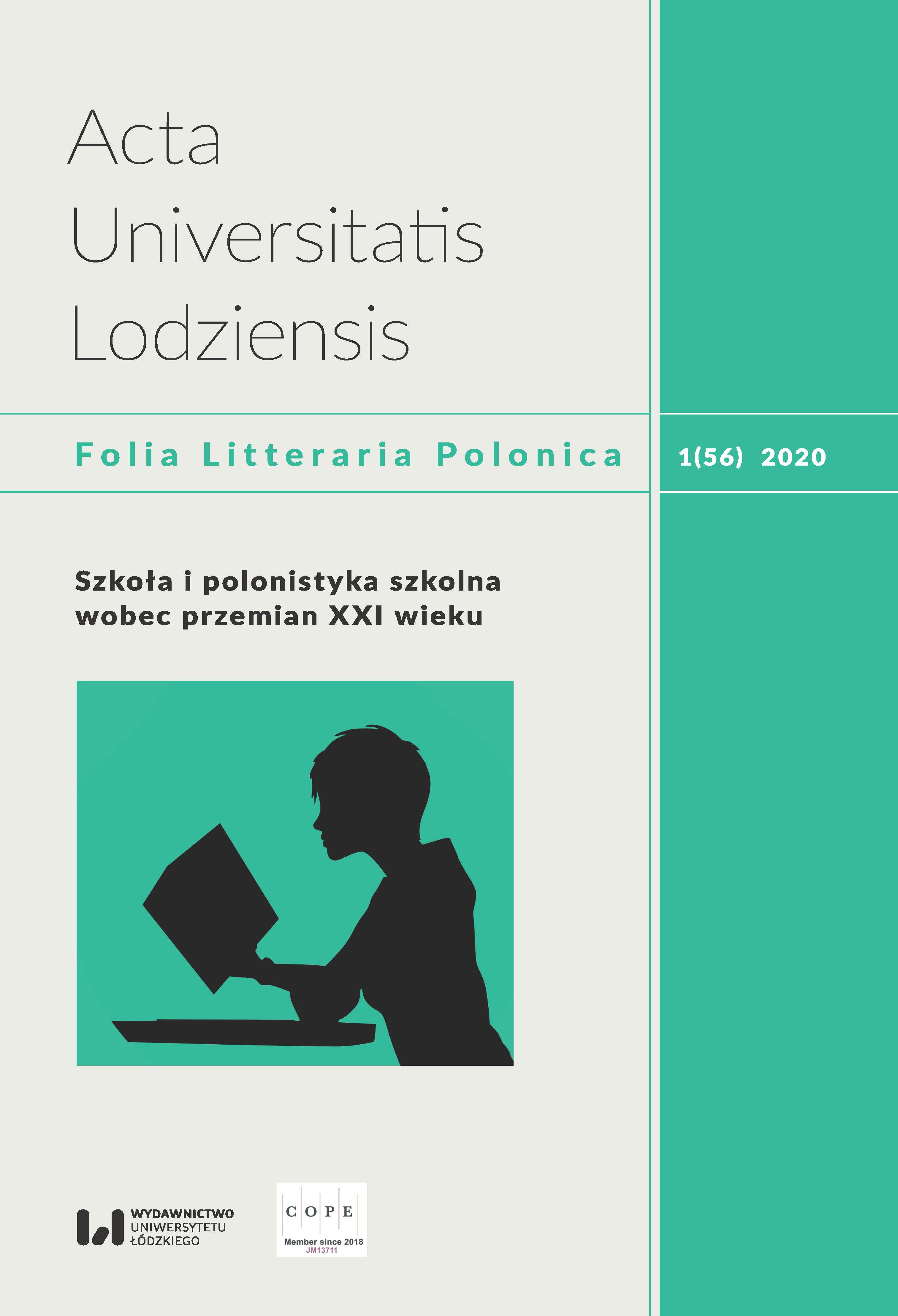Peri-literary communication games of high school students
DOI:
https://doi.org/10.18778/1505-9057.56.10Keywords:
interview, Internet resources, communication skills, social skills, apparent contact, hierarchical society, interest, Internet society, correlationAbstract
Seven interviews with high school students were conducted in order to establish the relationship between their use of Internet resources and the level of their interpretation, communication and social skills. Respondents, who used the Internet as a source of information, comprehend literature factographically and its adaptations as distortions of the original texts. Their communication skills were poorly developed. They were passive in interpersonal contact. They made only superficial contact with the interviewer, in order to hide the way they really used Internet resources. They perceived the interview as a hierarchical relation, and were subordinated to the interviewer.
Students who posted texts on the Internet were able to get the interviewer engaged in the topic they were discussing. They created their own image and influenced the environment. They assumed role of a node in the network, limiting the influence of social hierarchy.
A small sample does not allow for generalization of findings. Nonetheless, it was found that students who posted texts on the Internet presented highly developed interpretation, communication and social skills.
Downloads
References
Antos Gerd, Teksty jako formy konstytuowania wiedzy. Ewolucyjne fundamenty lingwistyki tekstu – tezy, trans. Zofia Berdychowska, in: Lingwistyka tekstu w Niemczech. Pojęcia, problemy, perspektywy, ed. Zofia Bilut-Homplewicz, Waldemar Czachura, Marta Smykała, Oficyna Wydawnicza Atut – Wrocławskie Wydawnictwo Oświatowe, Wrocław 2009, pp. 171–195.
Google Scholar
Biedrzycki Krzysztof, Justyna Jasiewicz, Radosław Kaczan, Tomasz Piechociński, Ludmiła Rycielska, Piotr Rycielski, Kamil Sijko, Maciej Marek Sysło, Kompetencje komputerowe i informacyjne młodzieży w Polsce. Raport z międzynarodowego badania kompetencji komputerowych i informacyjnych ICILS 2013, Instytut Badań Edukacyjnych, Warszawa 2014.
Google Scholar
Castells, Manuel, The rise of the network society. The information age: economy, society and culture, vol. 1, Blackwell Publishing Ltd., Oxford 1996.
Google Scholar
Castells Manuel, Społeczeństwo sieci, transl. Mirosława Marody, Kamila Pawluś, Janusz Stawiński, Sebastian Szymański, Wydawnictwo Naukowe PWN , Warszawa 2013, ed. 2., print 2.
Google Scholar
Czerski Piotr, My, dzieci sieci, “Dziennik Bałtycki” 11–12.02.2013, http://czerski.art.pl/my-dzieci-sieci/ [accessed on 8.09.2014].
Google Scholar
Dyduchowa Anna, Metody kształcenia sprawności językowej. Projekt systemu, model podręcznika, Wydawnictwo Wyższej Szkoły Pedagogicznej, Kraków 1988.
Google Scholar
Engel-Bernatowicz Agata, Specyfika kontaktu w wywiadzie psychologicznym, in: Wywiad psychologiczny 2. Wywiad jako spotkanie z człowiekiem, eds. Katarzyna Stęplewska-Żakowicz, Krzysztof Krejtz, Pracownia Testów Psychologicznych Polskiego Towarzystwa Psychologicznego, Warszawa 2005, pp. 54–80.
Google Scholar
Grajewski Wincenty, Fenomen Freudenberg, in: Olga Michajłowna Freudenberg Semantyka kultury, ed. Danuta Ulicka, Universitas, Kraków 2005, pp. VII –XXXI.
Google Scholar
Heck Dorota, Filologia i (jej) interepretacje, Dolnośląskie Wydawnictwo Edukacyjne, Wrocław 2012.
Google Scholar
Jedliński Ryszard, Gatunki publicystyczne w szkole średniej, Wydawnictwa Szkolne i Pedagogiczne, Warszawa 1984.
Google Scholar
Krejtz Krzysztof & Cypryańska Marzena, Dlaczego korzystamy z Internetu? Determinanty psychologiczne i społeczne, in: Diagnoza Internetu 2009, ed. Krzysztof Krejtz, Wydawnictwa Akademickie i Profesjonalne, Warszawa 2009, pp. 58–86.
Google Scholar
Krug Steve, Nie każ mi myśleć! O życiowym podejściu do funkcjonalności stron internetowych, trans. Piotr Cieślak, Helion, Gliwice 2014, issue 3.
Google Scholar
Kvale S., Prowadzenie wywiadów, transl. Agata Dziuban, Wydawnictwo Naukowe PWN , Warszawa 2010, issue 1 – 3 dodr.
Google Scholar
Lanson Gustave, Histoire de la littérature française, Librairie Hachette et Cie, Paris 1893, troisieme edition revue et corrigee.
Google Scholar
Lloyd Annemaree, Following the red thread of information in information literacy research: Recovering local knowledge through interview to the double, “Library & Information Science Research” 2014, vol. 36, issue 2, pp. 99–105.
Google Scholar
DOI: https://doi.org/10.1016/j.lisr.2013.10.006
Machul Rafał & Eryk Orłowski Analiza potrzeb użytkowników [internetu]. Raport z badań jakościowych, Centralny Ośrodek Doskonalenia Nauczycieli, 30.04.2009, http://www.bc.ore.edu.pl/dlibra/docmetadata?id=73&from=pubindex&dirids=1&lp=13 [accessed on 31.12.2017].
Google Scholar
Maslow Abraham, Motywacja i osobowość, transl. Józef Radzicki, Wydawnictwo Naukowe PWN , Warszawa 2006, issue. 2 (PWN – 1).
Google Scholar
“Niezatapialna Armada Kolonasa Wazona”, http://niezatapialna-armada.blogspot.com [accessed on 9.09.2015].
Google Scholar
Podstawa programowa kształcenia ogólnego dla gimnazjów i szkół ponadgimnazjalnych, których ukończenie umożliwia uzyskanie świadectwa dojrzałości po zdaniu egzaminu maturalnego. Attachment no 4, http://bip.men.gov.pl/men_bip/akty_prawne/rozporzadzenie_20081223_zal_4.pdf [accessed on 4.06.2015].
Google Scholar
Polakowski Jan, Badania odbioru prozy artystycznej w aspekcie dydaktycznym: zarys teorii – próby diagnozy, Wydawnictwo Naukowe WSP, Kraków 1980.
Google Scholar
“Poradnia Językowa” PWN , http://poradnia.pwn.pl [accessed on 31.12.2017].
Google Scholar
“Przyczajona Logika Ukryty Słownik”, http://przyczajona-logika.blogspot.com [accessed on 30.12.2018].
Google Scholar
Spitzer Manfred, Jak uczy się mózg, transl. Małgorzata Guzowska-Dąbrowska, Wydawnictwo Naukowe PWN , Warszawa 2007.
Google Scholar
Stemplewska-Żakowicz Katarzyna, Jak zrobić dobry wywiad (recepta metodologiczna), in: Wywiad psychologiczny. 1. Wywiad jako postępowanie badawcze eds. Anna Ślósarz, Katarzyna Stemplewska-Żakowicz, Krzysztof Krejtz, Pracownia Testów Psychologicznych Polskiego Towarzystwa Psychologicznego, Warszawa 2005, pp. 90–116.
Google Scholar
Stemplewska-Żakowicz Katarzyna, Metoda wywiadu w psychologii, in: Wywiad psychologiczny. 1. Wywiad jako postępowanie badawcze, ed. Katarzyna Stemplewska-Żakowicz, Krzysztof Krejtz, Pracownia Testów Psychologicznych Polskiego Towarzystwa Psychologicznego, Warszawa 2005, pp. 31–89.
Google Scholar
Tripp David, Critical Incidents in teaching: Developing professional judgement, Routledge, London 2011.
Google Scholar
DOI: https://doi.org/10.4324/9780203802014
Tripp David, Zdarzenia krytyczne w nauczaniu. Kształtowanie profesjonalnego osądu, transl. Krzysztof Kruszewski, Wydawnictwa Szkolne i Pedagogiczne, Warszawa 1996.
Google Scholar
Walas Teresa, Historia literatury w perspektywie kulturowej – dawniej i dziś, in: Kulturowa teoria literatury. Główne pojęcia i problemy, ed. Michał Paweł Markowski, Ryszard Nycz, Kraków 2006, pp. 93–136.
Google Scholar
Wojniak Justyna, Od podziału do nierówności – nowy wymiar cyfrowego wykluczenia, “Aequalitas” 2013, vol. 2, no. 1 (2), pp. 1–12.
Google Scholar
Downloads
Published
How to Cite
Issue
Section
License

This work is licensed under a Creative Commons Attribution-NonCommercial-NoDerivatives 4.0 International License.











